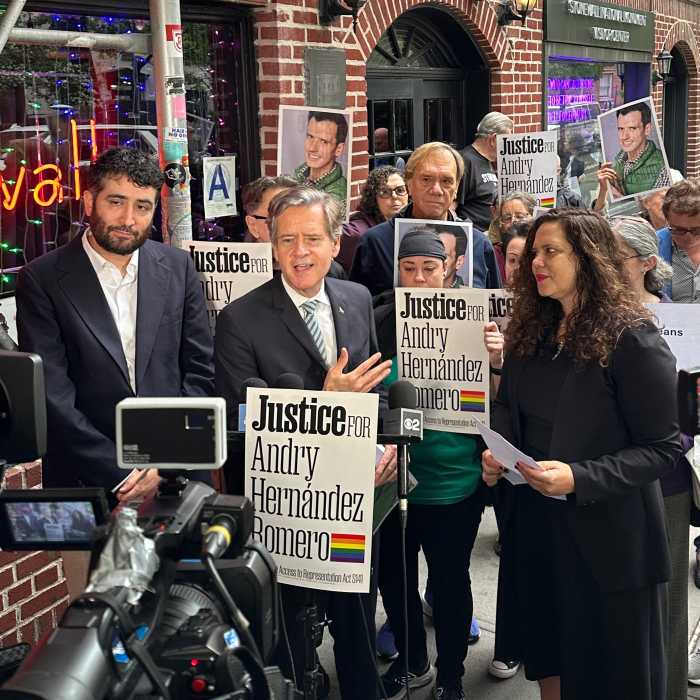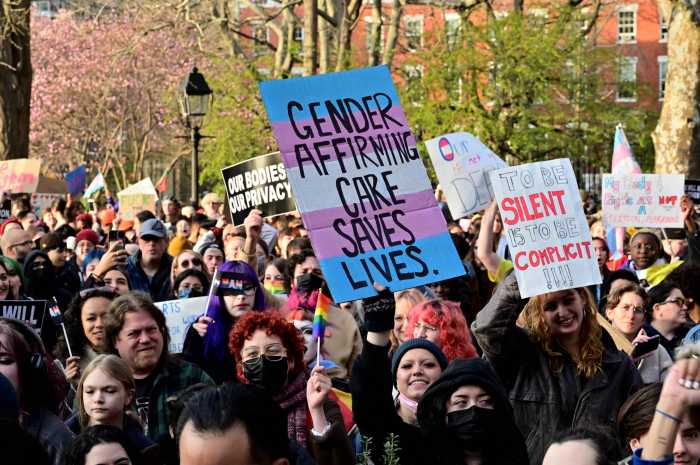BY DOUG IRELAND | Municipal elections in Iran last Friday gave a black eye to hard-line fundamentalist, ultra-homophobic President Mahmoud Ahmadinejad, as his supporters suffered a string of defeats.
The lack of confidence in Ahmadinejad was particularly strong in Tehran, Iran's capital, where his “Sweet Scent of Service” ticket won only five out of 15 City Council seats, and where his sister came in ninth, according to figures released by the Interior Ministry on Tuesday, with 80 percent of the vote tabulated.
The largest block of seats was won by the list headed by incumbent Tehran Mayor Mohammad-Bagher Qalibaf, a so-called “moderate” conservative who had been one of Ahmadinejad's rivals in the presidential elections last year that brought the authoritarian moralizer to power. Qalibaf's list picked up eight seats.
Two seats were won by reformist candidates opposed to Ahmadinejad's theocratic rigidity.
Since winning the presidency, Ahmadinejad has been leading a heavy-handedly repressive “cultural revolution,” marked by the jailing of dissident intellectuals and journalists, the purging of liberal faculty members from the universities, a crackdown on the press and the Internet, and a relentless campaign of arrests of gay people, who have been subject to tight police surveillance, Internet entrapment, raids on private homes and parties, kidnapping, imprisonment, torture, and in some cases forced gender reassignment surgery and execution.
Homosexuality has been a capital crime in Iran punishable by death since the 1979 revolution led by Ayatollah Ruhollah Khomeini overthrew the Shah of Iran and installed a severe religious regime based on Islamic Sharia law. According to the Iranian gay rights group Homan, more than 4,000 Iranian gays and lesbians have been executed in the two-and-a-half decades since Khomeini and his followers came to power.
But most commentators agree that Ahmadinejad's failure to deliver on the “populist” promises of his presidential campaign and improve the economy were what motored the protest vote last Friday. In last year's campaign, Ahmadinejad said he would use his country's oil revenue for the improvement of ordinary Iranians' lives.
But rampant inflation and stagnant wages, an iron-fisted campaign against labor unions (characterized by arrests of their leaders and government strike-breaking), new labor legislation that favors employers and makes it easier to dismiss workers without cause, and an aggressive program of privatization that is selling off all state-owned enterprises to big business have all combined to alienate some of the working class and economically disadvantaged voters who had been a key element of Ahmadinejad's 2005 electoral victory.
However, outside the cosmopolitan urban centers like Tehran, in the provinces, support remains strong for Ahmadinejad, Iranian political analysts say. And Ahmadinejad will remain in office at least until the next presidential election in 2009.
These election results do not mean that there will be any waning of Ahmadinejad's repressive “cultural revolution” and its anti-homosexual purge.
“Nothing major will happen” as a result of these municipal elections, said exiled Iranian political scientist Saeed Rahnema from Toronto's York University, “but it's an important signal. It sends a message to Ahmadinejad that despite the fact that he has the big machinery for mobilizing the masses, the rest of the public is not happy with him.”
This electoral slap in the face to Ahmadinejad came despite his regime's aggressive campaign to discourage voter participation.
“In order to defeat reformist candidates who have somehow survived the disqualification procedures and still appear on the ballot, the Judiciary, the ministries of Culture and Islamic Guidance, Information, and Domestic Affairs, the state-controlled radio and television, and the conservative newspapers were all mobilized to ensure low participation of the electorate,” said Iranian émigré Behrooz Ghamari, a professor of history and sociology at the University of Illinois Urbana-Champaign, and author of the forthcoming book “Islam and Dissent in Postrevolutionary Iran” (St. Martin's Press).
Moreover, Ghamari added, “The judiciary spokesperson threatened the newspapers that ran front-page news of the election with closure and censure.” But overall turnout across the country was about 60 percent of the roughly 46 million eligible voters, the Interior Ministry said. Turnout in last year's run-off election that made Ahmadinejad president was also 60 percent. The country's population is around 70 million.
There were also elections last Friday for the 86-member Assembly of Experts, an all-mullah body that appoints, for a life term, the Supreme Leader of the Islamic Republic of Iran. (The current Supreme Leader is Ayatollah Ali Khamenei.) In those elections, Ahmadinejad's spiritual mentor, fanatical fundamentalist Ayatollah Mohammed-Taghi Mesbah-Yazdi, came in sixth. Mesbah-Yazdi, who appears frequently in public with Ahmadinejad, is the de facto head of the Hojatieh-a secretive society, founded in the 1950s to purge Iran of the minority Baha'i faith-which has since become a redoubt of the most hard-line homophobic fundamentalists.
According to Agence France-Presse, Mesbah-Yazdi has aggressively argued for increased use of public floggings and executions for homosexuality as “immoral behavior,” saying both forms of punishment are a “fundamental principle” of Islam.
“If the Westerners do not like it, that is their problem,” he was quoted as saying, “but the death penalty and the use of flogging are fundamental principles of our religion.”
There have been reports that Ahmadinejad's mentor wanted to use last Friday's elections as a springboard to eventually replace Ayatollah Khameini as Supreme Leader, but Mesbah-Yazdi's poor showing suggests that was a still-born wish. First place in the elections for the Assembly of Experts went to former President Ali Akbar Hashemi Rafsanjani, beaten by Ahmadinejad in last year's presidential race; he was re-elected to the Assembly with 1.56 million votes, well ahead of the 880,000 votes garnered by Mesbah-Yazdi. However, when Rafsanjani was president he was shunned by Iranian reformers, who considered him a part of the conservative establishment.
Still, last Friday's strong protest vote against Ahmadinejad and his followers underscores the folly of a military attack against Iran if one hopes to see the end of his rule. Without exception, the democratic Iranian opposition to Ahmadinejad has insisted that, in the words of Iran's leading dissident, Akbar Ganji-a journalist released earlier this year after six years imprisonment for his views-“the regime will crush down the opponents harshly after such an attack and will close the political atmosphere completely. Iranian people and patriotic intellectuals will rise to the regime's support in case of a foreign attack and the regime will be strengthened instead of being toppled.”
The elections are not the only evidence of discontent with Ahmadinejad. The opposition is becoming increasingly vocal.
For example, an educational, door-to-door “One Million Signatures Campaign” by younger women's rights activists envisions a future “where powers, opportunities, and social goods are not divided based on gender differences or sexual orientation,” according to another leading Iranian scholar, Professor Nayereh Tohidi, the chair of the Women's Studies Department at California State University, Northridge and research associate at the Center for Near Eastern Studies at UCLA.
Another example: on December 6, Iran's annual Students Day, thousands attended a protest demonstration on the campus of Tehran University organized by Tahkim Vahdat, the country's largest student organization. Security forces at first tried to block entrances, but students eventually succeeded in breaking through the main gates.
Armin Salmasi, a member of the Council of Islamic Students, said, “They have sent our professors into early retirement, prevented many students from continuing their studies, forbidden not only protest, but even the act of breathing freely, and transformed our universities into military garrisons. Don't think that our patience is unlimited. Someday, the pot will boil over.”
Five days later, several dozen student hecklers interrupted a December 11 speech by Ahmadinejad, throwing firecrackers, burning a poster with his portrait, and shouting “Down with the dictator!” A military attack on Iran, as Ganji has pointed out, would give Ahmadinejad the renewed public support he needs to ruthlessly stamp out these harbingers of growing sentiment for democracy and reform -and would ruin the chance for an electoral breakthrough by the anti-Ahmadinejad forces in the parliamentary elections scheduled for 2008.
Doug Ireland can be reached through his blog, DIRELAND, at http://direland.typepad.com/direland/.


































